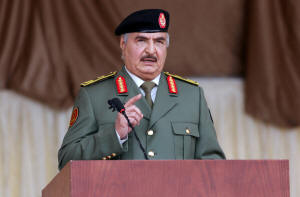Libya's proposed election is a moment of danger in push for peace
 Send a link to a friend
Send a link to a friend
 [September 24, 2021]
By Angus McDowall [September 24, 2021]
By Angus McDowall
TUNIS (Reuters) - Libya's best chance of
peace in years is at risk of unravelling as factions tussle over looming
national elections that were envisaged as a way to end a decade of
chaotic division.
As a cast of factional leaders position themselves for a presidential
run, many Libyans are bracing for a return to violence whether the vote
goes ahead as planned on Dec. 24 or not.
Already, the eastern commander Khalifa Haftar has paved the way for a
campaign by handing his duties to an acolyte, while Saif al-Islam
Gaddafi, the son of the former dictator, has indicated he may run too.
"The election process is heading towards disaster however things turn
out," said Wolfram Lacher, a Libya researcher at SWP in Berlin.
"Even in the best case in which there isn't a widespread boycott or
violence, there's a big risk that the losers won't recognise the
results," he said.

Not everybody agrees with that assessment. Many believe that whatever
the risks, elections are the only way to turn the page on endless
disputes among the established powers and confer legitimacy on rulers.
The United Nations and major foreign powers are all pushing for the
elections to go ahead, saying most Libyans want the vote, and inside
Libya all major factions are publicly demanding it takes place, whatever
their private stance.
But as the Dec. 24 date set by a U.N. peace process last year
approaches, the dangers appear to be mounting.
Libya has enjoyed little stability since the 2011 NATO-backed uprising
that toppled Muammar Gaddafi, and was split after 2014 between warring
eastern and western factions.
The U.N. process has installed a transitional unity government as well
as demanding elections for a new president and parliament to resolve the
crisis.
However the legal basis for the elections is bitterly disputed, meaning
that if it goes ahead without consensus on the rules, large parts of the
country may refuse to take part or will reject any results they dislike.
CONTROVERSY
Particular controversy has hung over the role of the parliament, which
was elected seven years ago and mostly backed the eastern side in the
war.
Its speaker Aguila Saleh said this month it had passed a presidential
election law that his critics said was tailored to allow him to run
without risking his role as speaker, and was rammed through without a
proper vote.
This week he went further, withdrawing confidence from the unity
government of Prime Minister Abdulhamid al-Dbeibah, a move that seemed
aimed at clipping its wings by undermining its legitimacy, in a vote
that also drew accusations of chicanery.
[to top of second column]
|

Libyan military commander Khalifa Haftar gestures as he speaks
during Independence Day celebrations in Benghazi, Libya December 24,
2020. REUTERS/Esam Omran Al-Fetori/File Photo

"It's a way of creating more urgency for the
elections as these announcements make it harder for anyone to bank
on the survival of Dbeibah's government," said Libya researcher
Jalel Harchaoui of the Global Initiative thinktank.
Dbeibah has won support with populist programmes and though he has
pledged not to run in the election, some Libyans hope he will, or
regard his unity government as a fallback if elections do not
happen.
Meanwhile parliament has not yet passed a law for a parliamentary
election - as mandated by the U.N. process - though it has said it
is working on one.
Any election would take place in towns and cities controlled by
armed forces whose own leaders may be candidates - opening the way
for losing opponents to cry fraud.
"Obviously in territories held by Haftar the level of control makes
it possible for him to organise the vote to ensure his victory,"
said Harchaoui.
Haftar's potential candidacy could be especially divisive after his
14-month assault on Tripoli that laid waste to whole city districts
before it was repelled last year.
"Sometimes when (military men) come into power they stay there
forever... he will pressure people. When they vote, they will do so
under fear," said Tripoli resident Yousef Mohamed.
The last war dragged in powerful foreign forces including Turkey,
Russia, the United Arab Emirates, Egypt, and an international array
of mercenaries.

That raises the stakes in any new bout of fighting, but with
powerful forces well entrenched, it may also mean that nobody will
risk another all-out war and would instead revert to the chaotic
partition that has carved Libya into pieces for years. (This story
corrects translation of quote in paragraph 21 to remove reference to
fear specifically benefiting one candidate)
(Reporting by Angus McDowall; Additional reporting by Ahmed Elumami
in Tripoli and Reuters Libya newsroom; Editing by Jan Harvey)
[© 2021 Thomson Reuters. All rights
reserved.] Copyright 2021 Reuters. All rights reserved. This material may not be published,
broadcast, rewritten or redistributed.
Thompson Reuters is solely responsible for this content. |